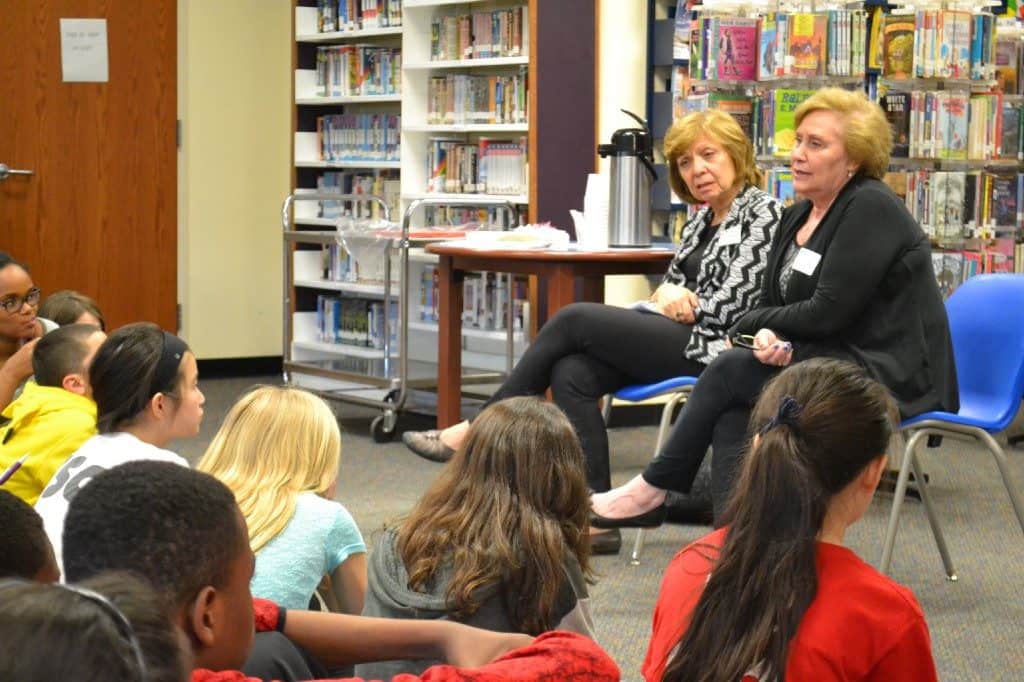
Ellen Zinn recounted the story of her parents’ lives and their retreat from post war Europe.

Cherry Hill resident Ellen Zinn, born in 1946 in Warsaw, Poland, was only 4 years old when her family immigrated to the United States.
Zinn recounted the story of her parents’ lives and their retreat from post-war Europe as she spoke to a group of sixth-grade students at Mt. Laurel’s Hartford School this week as part of a series provided by the Jewish Community Relations Council.
Zinn told students about growing up in New York with her brother and sister as “2G,” or second-generation Holocaust survivors, which she described as a somewhat “schizophrenic” upbringing, mixing fear of authority with a mandate to help those without power to help themselves.
“It can happen here, he (Zinn’s father) warned us time and time again. You grow up a little freaked out with feelings of being powerless in the face of so much hate and evil,” Zinn said. “On the other hand, you felt like you could do anything, accomplish anything, because they accomplished the impossible — they survived.”
Zinn’s father, born in Warsaw in 1910, was living in Paris when Nazi Germany invaded his homeland in 1939.
As he was forced to return to Poland, he became trapped in the infamous Warsaw Ghetto, where he became a runner and member of the resistance, sneaking out through sewers to bring food and supplies to those still trapped inside.
“They knew they were not going to survive. I think they knew from the get-go because the enemy was so overwhelming, but the decision was made that they were not going to go like sheep to the slaughter,” Zinn said. “They were not going to do that. They were going to go down fighting.”
When Zinn’s father was eventually caught outside the Ghetto only days before Nazis destroyed it in response to the Warsaw Ghetto Uprising, Zinn said rather than her father being executed on the spot or being sent to the Treblinka concentration camp from which very few survived, her father was sent to the Majdanek camp, where he remained alive for several months until he and a friend jumped off a train as they were being transported to Auschwitz.
“There were people who came through the war and they just got lucky,” Zinn said. “It was that lucky moment. It was circumstances and that was it.”
Zinn detailed to the students how her father and his friend lived in the woods for nine months, hiding in trenches and surviving on the scarce food provided by a local Christian farmer, before the area was liberated by the Russian Army at the end of the war, with her father at the time weighing just 85 pounds.
While at a Russian field hospital, Zinn’s father met her mother, a Romanian-born field nurse who had been sent to Moscow for training as the Russians swept into Romania at the beginning of the war.
With her parents married shortly after and the war over, Zinn’s father returned to Warsaw with his new wife, with Zinn born not long after.
Zinn said her family remained there until it became obvious to her family that life in Russian-controlled Poland would be difficult as well, and they were eventually smuggled through Czechoslovakia to Allied-controlled Germany to a camp for displaced persons to wait for a U.S. Army transport ship to America.
Zinn recalled a story of her mother on the transport ship learning about America’s diversity and strength when she met a soldier — the first black man she had ever seen in her life — who came to her cabin late one afternoon.
“He never said one word. He just handed my mother a brown paper bag and left. The bag was filled with oranges … she learned then and there how special America was,” Zinn said.
When a student asked Zinn if she had a good childhood and life once her family immigrated to America, Zinn answered that she did, and noted her parents were able to put herself, her sister and her brother through college and graduate school.
“They wanted that American dream for their children. They really did,” Zinn said.
Zinn told the students she had actually never spoken to a group of young students about her family’s story until this week, but to prepare she gave a similar presentation to her own grandson who is also in sixth grade.
“He said to me, you know, Grandma, when you go to the movies and watch aliens kill thousands of people, your comment is ‘sucks for you,’ but when you hear a story about one person dying or 10 people dying, it really hits you,” Zinn said.
Zinn told the students her grandson’s comment was the reason why she and others like her work to share the events of the Holocaust by using one person’s story at a time.
“The message I want you guys to take away is not to forget about this and to always remember that people can be really horrible to each other, but by the same token, they can also be very good to each other. That’s the message I want you to take,” Zinn said.









